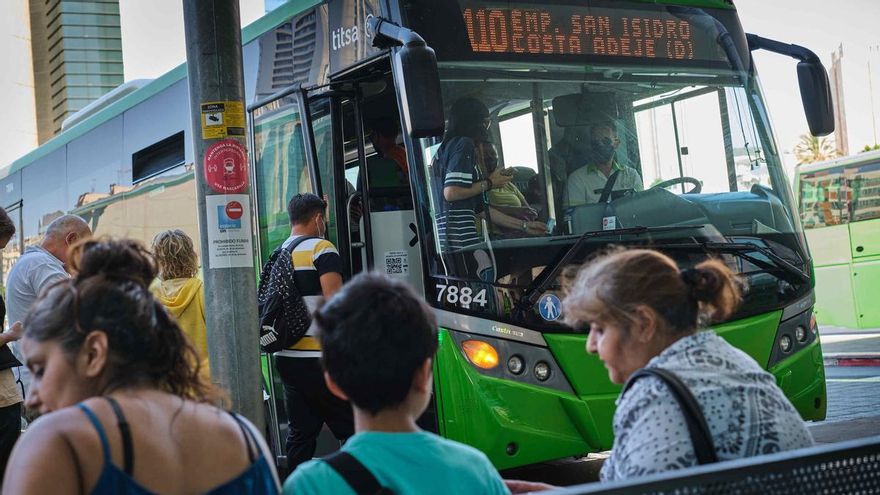
He Tenerife Council guarantees free public transportation on buses and trams on the Island during 2024. The island president, Rosa Davilaannounces that They have their own funds to face the measure, even if the Congress of Deputies does not approve this Wednesday the State Government Decree to subsidize it. In addition, the extension of the renewal of the vouchers will go from one to three months with the intention of “prioritizing the frequent user” of public transport in both Titsa and Metrotenerife.
The initiative aims benefit residents, specifically to those who purchase travel vouchers. It will become a reality again for the second consecutive year, no matter what happens in today’s vote in the Senate – Congress is in progress – which must confirm or not the subsidy from the state Executive that amounts to 81 million euros. In principle, one quantity for all Canary Islandsconsidered insufficient by the regional government and councils which raises it to between 40 and 60 million more in order to cover the total cost.
The island president, Rosa Dávila, assures that “we have enough treasury leftover to face the expense, even if it breaks us and we hope that the Government of Spain comply, move the budgets forward and cover the budget deficit that exists. Dávila recalls that “we anticipated it and this was approved in the last insular Government Council in December, on the same day, but before the state government agreed to it.” He also adds that “we have already contributed 20 million to free, which amounted to a total of about 51, during 2023.” It has been in force since January 1 of last year.
Rosa Dávila also points out that «We intend to make the period for the renewal of bonds more flexible, which is currently monthly, to make it quarterly.». He explains that “we are studying the number of trips necessary to benefit because we maintain the need to make cancellations, although in principle it would be 30 in this new temporary period.” That would mean “not having to worry about canceling and guaranteeing free cancellation.” Now it is 10 after the September reduction, at the initiative of the Cabildo itself, from the initial 15.
The island president emphasizes that “we thank the Government of the Canary Islands that has placed in the councils the responsibility of developing the measure and the freedom of how it is applied. He values that “the restrictions of the previous one (the 15 trips as a requirement) were not in the original agreement of the Council of Ministers.” He summarizes: “We thought that what they intended was to derail a positive measure for the people, as has been more than demonstrated with the increase in travelers by 40%.”
Dávila argues that, for example, the fifteen cancellations “made it difficult to provide free services in non-capital islands.” In fact, he points out, “El Hierro, with a socialist island government, did not apply it.” He points out that the objective of gratuitousness is twofold. On the one hand, taking away from the regular user the added burden caused by the effect of inflation and the enormous increase in prices of basic products or rent while maintaining the guarantee of their mobility. On the other hand, attract travelers for public transportation and at the same time remove private vehicles from the saturated roads of the Island.
We went ahead and already agreed in the last December council to guarantee free
The president maintains direct contact with Teodoro Sosa, Minister of Transport of Gran Canaria, because The problem is “similar” in inhabitants and users although there free cancellation is obtained with 15 cancellations. Therefore, he says, “we go hand in hand.”
Another clear idea: «We will make the current requirements more flexible to obtain free tuition because I give the example of a ULL student who did not go to university in August and missed it. “We want students and workers to be the big beneficiaries.” As long as they are residents. Ahonda Dávila: “We do not want to attract a tourist who comes to spend a day nor do we consider that groups such as migrant foreigners who claim it can be included because, I insist, they are not residents.”
Frequent users
Above all, Dávila emphasizes, «We intend to direct the focus to those who use public transport frequently to prevent other people from validating the trips even in a few minutes and obtaining it for free». They get on, make journeys and “take places away from those who really need them and often stay at the stops.” Regarding mobility, in general, the president emphasizes that “it is not only a question of infrastructure or roads but of removing cars from the roads.” She expresses her concern about “the high demographic burden” of Tenerife and how to respond to population growth in a reality very different from that of other islands. She offers a fact: the 1,200 new health cards every month.
The objective is to prioritize the frequent user and the renewal of the bonus will become quarterly
She points out that she is a regular user of public transportation. He understands, therefore, the “frustration” of those who are left stranded at the stop, as frequently happens at the San Isidro stop. For this reason, she explains, “the purchase of 250 new buses and soon more trams or incorporating in a few months 75 drivers to the fleet Titsa». He indicates that “the previous Cabildo government did not prepare for an exponential increase in demand.”
Rosa Dávila concludes: “We do not see the positive side of eliminating cancellations, it would be something harmful because people would occupy buses and trams almost compulsively and that would take away space for those who need to travel. We are committed to travel vouchers for Canarian residents, young people, seniors or people with disabilities.
















